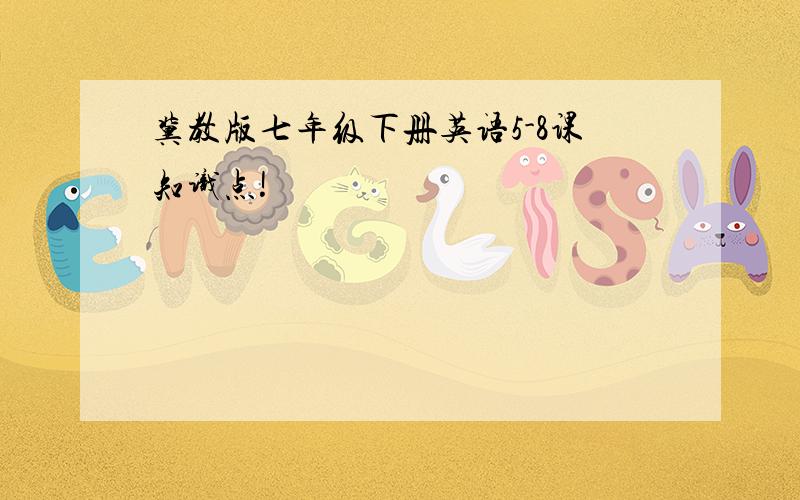冀教版七年级下册英语5-8课知识点!
来源:学生作业帮助网 编辑:作业帮 时间:2024/11/18 09:41:34

冀教版七年级下册英语5-8课知识点!
冀教版七年级下册英语5-8课知识点!
冀教版七年级下册英语5-8课知识点!
二. 重点、难点分析
1.You speak good English ! Does everyone in your family speak English?
你英语讲得很好! 你家里人都讲英语吗?
speak 动词,当表示说某种语言时,是及物动词.如:
I can speak Japanese.我会说日语.
Can you speak French? 你会说法语吗?
The teacher asked us to speak English in class.老师让我们在课堂上说英语.
speak 做不及物动词时后常接介词to 或with sb. 表示与……说话,接about 或of,表示“谈到……”,接on sth.,表示谈某方面的问题.Speak 也常作为打电话用语.如:
The baby can’t speak. 这婴儿不会说话.
He is speaking at the meeting . 他正在会上发言.
—Who is speaking? 哪位呀?
—This is Bill speaking. 我是比尔.(打电话用语)
2. —How old are you, Li Ming? 你多大了,李明?
—I’m thirteen years old. 我十三岁了.
How old 是对年龄的提问,但在西方国家,年龄是个人隐私,一般不便于当面提问.如:
—How old are you, Mrs. Green? 你多大年龄了,格林夫人?
—It’s a secret. 这是个秘密.
—How old is the baby? 这个婴儿多大了?
—It’s five months old. 他有五个月大.
3. —What’s for supper? 晚饭吃什么?
—I’m cooking meat and vegetables. 我正在做肉和炒菜.
for supper 对于晚饭来说.如:
What would you like for supper ? 晚饭你想吃什么?
I’d like some noodles for lunch. 午饭我想吃面条.
cook 及物或不及物动词,意为“烹调;烧”;还可用作名词,意为“厨师”.
其现在分词为cooking. 做饭,通常用词组do some cooking. 如:
Do you like cooking? 你喜欢做饭吗?
I cooked some potatoes for him . 我给他煮了一些土豆.
常见错误:它是一位厨师.
误:He is a cooker.
正:He is a cook.
4. This is delicious, Mrs. Smith.
史密斯夫人,这饭很好吃.
delicious 形容词,意为“美味的,可口的”,其比较级,最高级为more delicious, most delicious. 如:
Those mooncakes look delicious. 那些月饼看起来很好吃.
How delicious they are! 多好吃啊!
5. Please pass the peas!
请把豌豆递给我!这是一个祈使句,表示请求的意思,祈使句的主语一般都是第二人称,但通常省略主语,谓语动词总是用动词原形.祈使句的否定式用Don’t+动词原形(不能用Do not),为使句子语气客气,委婉,常常在句首或句末加please,标点符号用句号或感叹号.如:
Come in , please.请进.
Sit down , please. 请坐.
Don’t worry. 别担心.
pass 意为 把某物从…… 尤指用手直接传递.
Pass 可用pass +间接宾语(表示物)这个句型,或pass+物+to+人的句式.如:
Pass me the salt , please. 请把盐给我递过来.
Please pass the book to me. 请把书给我递过来.
6. Are they playing loudly or quietly?
他们只在静静地打还是大声喧哗地打?
They are playing quietly.
他们在静静地打.
该句为选择疑问句及其回答.选择疑问句在结构上同一般疑问句相似,两部分由or连接起来,前部分用升调读,后部分用降调读,其句子结构为:一般疑问句+or+简略的一般疑问句?or 连接的两个并列成分是一致的,or之后的疑问句与之前的疑问句中重复的部分通常省略,因此是简略的一般疑问句,回答可以选择其中一个回答,也可比较灵活.如:
—Is James a boy’s name or a girl’s name? 詹姆斯是男孩的名字还是女孩的名字?
—It ‘s a boy’s name. 是男孩的名字.
—Would you like some bread or rice? 你想要面包还是米饭?
—I’d like some rice. 我想要大米.
7. Let’s get to work , class!
同学们,让我们开始上课.
class 在本句中译为“同学们”,是集体名词.如:
Good morning, class! 同学们,早上好!
class 还可以表示学校里的班级.如:
How many classes are there in your school? 你们学校有多少个班级?
We’re in Class Three, Grade One.我们在一年级三班.
class还可以表示“课堂”“课堂教学活动”.如:
It’s time for class.到了上课时间了.
Don’t talk in class. 不要在课堂上讲话.
辨析:class, lesson
lesson 与class 在着重指教学的“课时”时,可互换使用.如:We have five English classes(lessons) every week.我们每周有五节英语课.但以下几种情况只能用lesson,不能用class.
(1)表示“(几)课”“第(几)课”时.如:
Lesson ne is very easy. 第一课很容易.
There are twenty-four lessons in Book One. 第一册有二十四课.
(2)表示“功课”“作业”时.如:
I often do my lessons in the evening. 我经常晚上做作业.
(3)表示“学科”“课目”时.如:
We study Chinese, maths, English and other lessons.
我们学习语文、数学、英语和其它学科.
8. —How’s the weather today, Steven?
今天天气怎么样,斯蒂文?
—It’s rainy and cool.
今天凉爽而多雨.
这是对天气状况的提问及其回答.问天气状况还可以用What’s the weather like today?
回答用:
It’s sunny/windy/cloudy/rainy/snowy… .
It’s cold/hot/wet/dry/cool/warm… .如:
—What’s the weather like today? 今天天气怎么样?
—It’s sunny and hot.天气晴朗而炎热.
9. What’s the temperature outside/inside/now?
室外/室内/现在的温度是多少?
这是一个询问温度的特殊疑问句,疑问词用what, outside ,inside, now 都是副词,回答用it’s…degrees. 如:
—What’s the temperature in the room?这个房间的温度是多少?
—It’s twenty-two degrees. 是二十二度.
10. These words get bigger with an s at the end.
这些词在词尾加s 后变大了.
(1)get 作“变得讲”,是系动词,后接形容词作表语,类似的动词有:look看起来;become成为;turn变得;smell闻起来等等.如:
The day get longer and the night get shorter.
白天变得越来越长,晚上变得越来越短.
The woman looks very young. 那个女人看上去很年轻.
He became a doctor. 他成为一名医生.
The trees turn green. 树变绿了.
The meat smells delicious. 肉闻起来香极了.
(2)at the end (of) 在……的尽头(末尾) .如:
There is a bus stop at the end of the street. 在街道的尽头有一个汽车站.
At the end of the film the girl met her parents.
在这部电影的结尾这个女孩见到了她父母.
11. Li Ming, do you always do your homework?
李明,你总是做你的家庭作业吗?
这是一个一般现在时态的句子,表示经常发生的动作或存在的状态,常与表示频度的时间状语连用.如always, usually, sometimes, never 等.对频度副词提问,疑问词要用how often, 频度副词一般放在行为动词之前,be动词、情态动词、助动词之后,有时也可用于句末或句首,用在句首表示强调.如:
He is always the first student to get to school.
他总是第一个到校的学生.
They usually have lunch at school. 他们通常在学校吃午饭.
I like watching TV, but sometimes I do some reading.
我喜欢看电视,但是有时我也阅读.
She never does her homework too late. 她从不做作业做得太晚.
12. Let’s put a triangle for always.
让我们划个三角代表“总是”.
put…for意为“代表”.如:
Let’s put a circle for usually. 让我们划个圈代表“通常”.
Let’s put a square for sometimes. 让我们划个正方形代表“有时”.
Let’s put a line for never. 让我们划条直线代表“从不”.
13. Danny, do you wear dresses?
丹尼,你穿裙子吗?
wear是及物动词 ,表示穿着、戴着(强调状态), 留着(长发、胡须)等.如:
She is wearing a blue dress today. 她今天穿着蓝裙子.
Mrs. White always wears a red cap. 怀特夫人总是戴一顶红帽子.
Do you wear a watch today? 你今天戴手表了吗?
The boy wears long hair. 这个男孩留着长发.
我才上五年级,我很想帮你,但帮不了